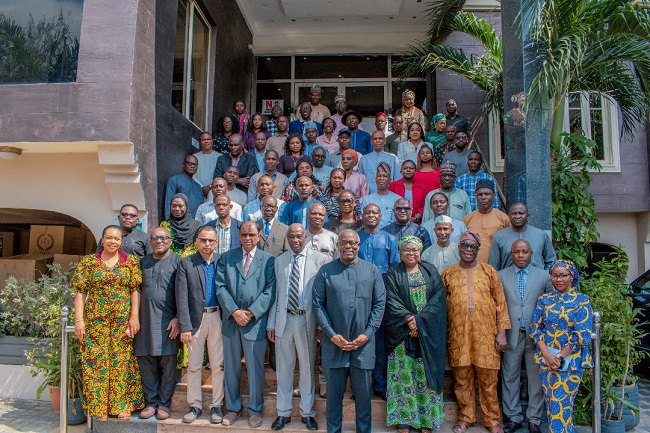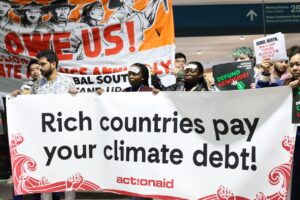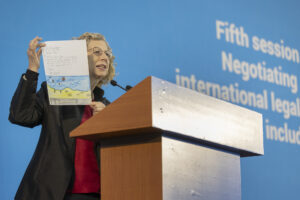
BY MUSA SHUBOMI TIMILEYIN
Participants at the recently held workshop for the preparation of Nigeria’s First Biennial Transparency Report (BTR1) and a Combined Second Biennial Transparency Report (BTR2) and the Fourth National Communication (NC4) have been urged to always consider generating accurate data anytime they are reporting because this will go a long way in helping Nigeria to meet the desired aspirations to keeping the global temperature at 1.5 Degree Celsius.
Dr. Salisu Dahiru, Director General of the National Council on Climate Change (NCCC), gave the charge in Lagos at the five-day workshop organised with the support of the United Nations Development Programme (UNDP) and Global Environment Facility (GEF).
Represented by Mr Michael Ivenso, NCCC’s Director, Energy, Transport and Industry, Dr Dahiru said: “Nigeria, being a Party to the UNFCCC and its Paris Agreement, must prepare and submit national reports of emission of greenhouse gases by sources and removal by sinks, mitigation actions, adaptation impacts, and support received or needed, which is following the decisions and guidelines of reporting under the Convention.
“To meet this obligation, Nigeria has prepared and submitted to the UNFCCC, three reporting cycles in the National Communication, two in the Biennial Update Report and currently commenced the preparation of the BTR1-BTR2-NC4. The BTR 1 is expected to be submitted to the UNFCCC by December 2024 as mandated in the Paris Agreement.”
In his submission, a climate change expert, Professor Emmanuel Oladipo, urged participants to take their time to study the Nigeria National Health of 2019 because there are lots of policies in the document which will be useful in implementing the right policies if adopted.
He said: “I cannot believe that a nation as big as Nigeria with all its potential has not been able to increase its energy generation for the past 30 years. We need to read and understand the document, Nigeria is suffering a lot of things since lots of policies are in the document which are yet to be effected.
“We need to study this document critically and report them yearly so that the policymakers will determine which one to implement.”
Some of the participants who spoke after the events were full of praise for the organisers and admitted that the workshop had impacted them positively.
Mr. Rasaki Yekini, Deputy Director of the Animal Husbandry Services Department, Federal Ministry of Agriculture and Food Security, said the workshop is a welcome development.
“I believe as a member of staff of the Federal Ministry of Agriculture, this workshop will go a long way in helping us formulate policies that will boost food security which is one of the paramount agendas of President Bola Ahmed Tinubu,” he opined.
Peter Baba Shiru, Chief Scientific Officer with the Department of Linkages and Collaboration and Consultancy, Energy Commission of Nigeria, noted: “As we speak there is no basis for climate change mitigation and what we are doing right now is to have a basis which we can update year-in, year-out but the most important thing is to have a basis of a climate change data across different sectors.
“The workshop will help Nigeria in different ways because if data are there, people can go into the website whether in the public domain of Nigeria Bureau of Statistics to access the information.
“My take-home is that the Energy Commission has a series of policies over the years that have never seen the light of the day but in this workshop, we have been told that Energy Data Balance that has been in existence in the Energy Commission of Nigeria would be used as a basis as a starting point.
“So, in Energy Commission, the research that we have done a few years ago is still there documented. My D-G will be happy to hear that the policy that has been in our custody for years will now eventually be displayed on the international platform offered by NCCC.”
Alice Eze, Chief Operating Officer, of Climate Action Africa, opined: “Despite the workshop coming a little bit late, it is better late than never, and I agree with the organisers who say we need to tackle head-on the problem of data in Nigeria. It is a massive problem because you cannot get any solution if you don’t have accurate data. I hope whatever resolutions that are made during the workshop are carried out to the letter and the participants get all the support needed for proper implementation.
“Because the impact of climate change is far-reaching, especially in certain regions within Nigeria, I’m hoping that the Federal Government gives participants the utmost support needed especially in terms of funding because it is going to take a lot for people to go around sourcing for data. I also hope that whatever outcome from this goes a long way in influencing policies to ensure that we meet our targets,” she concluded.






